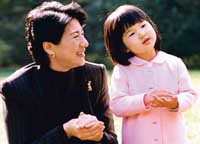Stressed-out royalty: After crown princess, Japan's empress falls victim to stress
It's not easy being a woman in Japan's royal family.

Four years after Crown Princess Masako dropped most of her official duties to recover from what officials say is a form of depression brought about by the pressures of adjusting to life in the palace, Empress Michiko is now suffering from a wide array of symptoms stemming from severe stress.
Officials announced last week that Michiko, 72, is canceling her schedule for the time being to recover from intestinal bleeding, nose bleeds and mouth ulcers. She had been feeling ill since catching a cold last month, the palace said.
The empress' illness highlights both the pressures and secrecies of Japan's royal family, which is believed to be the oldest in the world but has fallen on hard times in recent years because of a succession crisis and, more recently, some bad press.
"It is believed that the empress is suffering from symptoms related to psychological stress," said Ichiro Kanazawa, the palace's chief medical supervisor. Officials said they believed recent coverage of the royal family might be to blame.
Officials have not said what specifically might have upset the empress.
But the palace has recently been in an uproar over the publication of a book on the royal family by Australian author Ben Hills. The book, "Princess Masako: Prisoner of the Chrysanthemum Throne," has been slammed by the palace as disrespectful, and a Japanese publisher announced last month it decided to scrap plans to translate it into Japanese.
The book alleges that Masako has also been under intense pressure from the palace bureaucracy to conform to its traditions, keep a low profile and forgo trips abroad until she bears a son. Hills also wrote about growing tensions between members of the imperial family itself, largely generated by the pressure on Masako to produce an imperial heir.
Japan's Imperial Household Agency and Foreign Ministry have demanded an apology from Hills for "disrespectful descriptions, distortions of facts and judgmental assertions with audacious conjectures and coarse logic." The government also protested to Random House in Sydney.
Hills said he is "scandalized" by the palace's response to his book.
"I have received responses ranging from death-threats, presumably from the deranged ultra-nationalists, to congratulations for my honesty," Hills said in an e-mail to The Associated Press. "What is important is that the Japanese people should be allowed to read the book and make up their own minds. This the Japanese government is determined not to allow them to do."
Books critical of the royal family and its palace handlers are rare in Japan.
Criticizing the emperor _ once revered as a living god _ was regarded as a serious crime in the first half of the 20th century and there is still a strong tradition in Japan of respect for the royal family, which is zealously shielded from view by secretive palace officials.
This was not the first time that Michiko has withdrawn after being criticized in the media.
In the early 1990s, she was unable to speak for months after suffering a nervous breakdown, reportedly over unflattering stories in gossip-oriented magazines. The stories were relatively mild by comparison with what might regularly be found in the British press. Michiko was portrayed as demanding and sometimes curt with her staff.
Years earlier, Michiko, the commoner daughter of a wealthy merchant, is believed to have been severely taunted by former aristocrats, many of whom were part of the palace bureaucracy, after she wed Emperor Akihito, who was then crown prince.
Crown Princess Masako, Michiko's daughter-in-law, is also recuperating from stress-induced health problems brought on by the pressures of palace life.
Masako, 43, withdrew from virtually all of her public duties four years ago after being diagnosed with a stress-induced illness called "adjustment disorder."
A well-liked former diplomat who was educated at Harvard and Oxford, Masako had been under intense pressure to have a baby boy to succeed Crown Prince Naruhito as the next heir to the throne.
After their marriage in 1993, however, she suffered a miscarriage in 1999 and then had a daughter, Aiko, in 2001. With no other male heirs in the generation after Naruhito, Aiko's birth generated a movement to revise imperial law to allow the girl to assume the throne, reports AP.
But that effort has been put on hold since the birth of a son to Naruhito's younger brother.
Subscribe to Pravda.Ru Telegram channel, Facebook, RSS!




